From PhD to MD by Dr. Harley Yoder
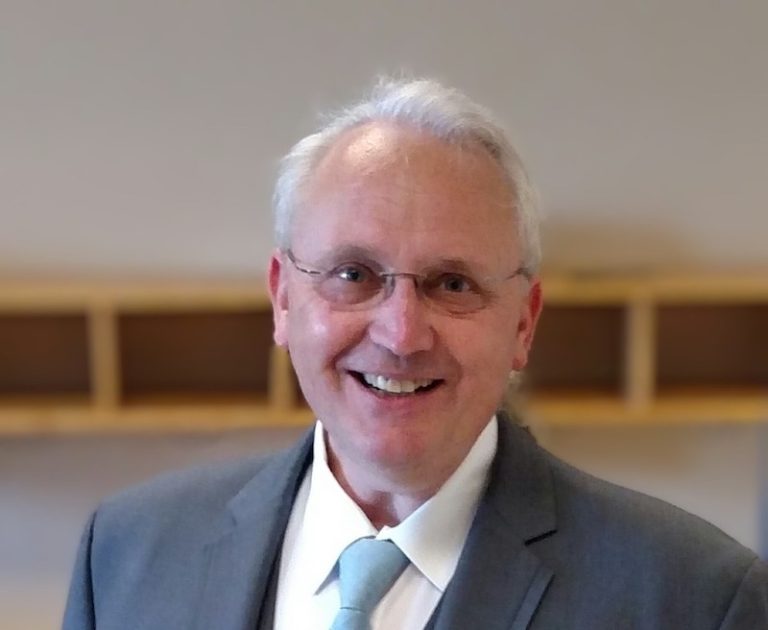
After a pause (I will explain the pause at a later date), I return to publishing stories from attendees of the symposium “How Our Amish Heritage Influences Our Education and Career” at Elizabethtown College on June 8. All of the stories we heard that day were triumphant, and this one by Dr. Harley Yoder is no exception.
Dr. Harley Yoder
I was raised in an Old Order Amish family in rural Milford, Indiana, the next to youngest of 8 children. My father was a farmer, and during the winter while the land lay fallow, he did construction work. My mom was a full time homemaker.
Our family valued education through the eighth grade. I remember before starting my formal education my parents buying me educational study books from the local Five and Dime – Reading, Math, Phonics, etc. My older siblings were eager teachers – we played “School”- and I was a willing learner.
First grade was at a local public school. My mother told me later that I was reading at a third grade level in first grade. My Amish church district built a new school building and I went to a one room school from second through ninth grades. We had up to 32 students for all 8 grades. My class had 4-5 students, and many of us were classmates for 8 years. My oldest sister was my teacher in 2nd and 3rd grades. We had classmates that received cash rewards for every “A” they got on their report cards. We didn’t get those rewards – we were expected to bring home “”A’s” free of charge.
My second cousin was my teacher from grades 5-9. He was the best Amish teacher in the Nappanee area. He had many years experience and he would give me enrichment projects and allow me to do self study in areas that interested me to keep me from getting bored. I loved studying and learning.
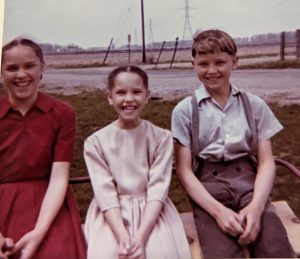
The only photo I have of myself as a child. I was probably first or second grade sitting beside my younger sister, Sue. My older sister, Eva is sitting with us on the pony cart.
In the 6th grade, when I was 11 years old, somebody knocked on the outside school door during class and my teacher answered the door. He gathered my sisters, brother and me outside the school and told us that Dad had died unexpectedly that morning at the age of 42.
One year later we were playing softball at school and a neighbor stopped by with more bad news. My 17 year old brother had died in a farming accident. That rocked my world.
There was no counseling. Nobody to help us work through the grief and loss. For the next two years whenever somebody knocked on the school door my body would freeze, expecting nothing but more bad news.
We all went to school through 8th grade, but some of us had to take 9th grade classes until we turned 15. Ninth grade consisted of going to school on Saturday morning and completing homework during the week. We were allowed to do “projects” during the week and had to keep a diary of our projects. We basically had jobs during the week as our projects and were encouraged to stay out of public because we were 14 years old and not in school.
My ninth grade project was being a farm hand helping care for 400 veal calves. I would feed the calves at 5:00 a.m. and p.m. It became untenable to live at home because I would get up at 4:00, eat breakfast, ride my bike three miles to the farm, work all day and get home at 9:00 p.m. to go to bed.
I moved into the home of my employer. He was a student at the Mennonite Seminary, his wife was the choir director at the local Mennonite church and they were youth leaders. I got to know the Mennonite youth and at age 14 started attending the Mennonite church instead of staying with the Amish church. All the youth were in high school except me. I really wanted to go to high school and my employer took me to the local high school and enrolled me, but my mom vetoed that idea. She needed my income to make ends meet financially. I had been filing federal income taxes since the age of 11 with my jobs at catching chickens during the school year at night and vaccinating chickens during the summers.
My employer sold the veal farm, moved to Chicago and began a pastorate there. I moved back home and started doing construction work with a local crew of Amish men. I did construction during the day and read books at night. We did hard physical labor – dug footers by hand, hoisted rafters onto roofs without cranes, hauled shingles 2 stories up ladders on our shoulders. The Amish have a good sense of (self-deprecating) humor. While digging post holes with a Post Hole Digger, we would announce that we now have a PhD. Not to demean people who had earned PhDs, but to poke fun at us working with our PhD with sweat on our brow.
The economy was in a downturn in 1980 and I saw that the Mennonite Board of Mission was looking for volunteers to do construction work during the winter in the southern US. I called them up and said I would be available to work for 2 months. They were looking for retired volunteers with RVs that could house themselves while working. I didn’t fit that bill. The Mission Board told me they were also looking for volunteers to do construction work in Dublin, Ireland for 2 months. I fit that bill!
My mother was very opposed to me going to Ireland for fear that she would never see me again. I went against her wishes and landed in a most engaging, stimulating environment. I worked with 5 seminary educated missionaries and we had the most thoughtful theological discussions and discussed topics I had never thought about before. They told me that I needed to go back to Indiana, get my GED and enroll at Goshen College.
That is exactly what I did. I got my GED, struggled through the SAT and enrolled at Goshen College (on academic probation because I didn’t have a high school GPA) the fall of 1981. I had no idea what I wanted to study when I enrolled. I took a bunch of general studies courses and liked history and Bible classes, but when I took my first biology class I was really hooked.
My friends that were studying science were heading to grad school, dental school or medical school. I wasn’t sure what I wanted to do but knew that if I went to medical school I would not have the opportunity to do voluntary service for at least a year, which is something else I wanted to do.
I took a “gap year” my junior year and went to Brazil and worked at a daycare center under MCC’s Serve and Learn Together (SALT International) program the second year of its existence. I worked with German and Portuguese speaking Mennonites and my host family was also fluent in English. I studied Portuguese and Spanish before going to Brazil and took several university correspondence courses while in Brazil, so I didn’t lose out on any academic time while absent from the Goshen College campus.
I graduated from Goshen College with a natural science/pre-med degree the year after I returned to Brazil. I applied to medical school my senior year. Most students apply in their junior years so they can start med school the fall after graduating college. I had to take another gap year since I applied as a senior.
During college I had done work study in the Mennonite Historical Library. I answered genealogy questions that people sent to the library and had become familiar with the index of all the Amish genealogies that Dr Victor McKusick at Johns Hopkins Medical School had put together. I contacted Dr McKusick and asked if I could work with him for a year until entering medical school
He took me on and I had a close look at academic medicine. Dr MuKusick had done extensive work with the Amish in Lancaster County and all the recessive genetic conditions that population had. He is known as “the father of medical genetics.” I took field trips with him to Lancaster to re-establish contacts with the families he had known in the past and update their genealogies and worked with him on his textbook “Mendelian Inheritance in Man.”
I started medical school at Indiana University Medical School after my year at Hopkins. I completed a residency in Family Medicine, got married between my 2nd and 3rd years of medical school and am in my 31st year working as a family doctor – 27 years in Elkhart, Indiana.
My Amish heritage and education guided me through the years of higher education. I had a sense of purpose, even if I didn’t know all the details. I knew how to apply myself and work hard. I learned in elementary school that it’s ok to be curious and look for answers. Goshen College instilled in me more of that sense of service – Culture for Service is the GC motto.
My adolescent years and early college years were rough. I did many things my mother was opposed to – joining the Mennonite Church, going to Ireland, getting my GED, enrolling at Goshen College, going to Brazil. Nobody from my family was present at my baptism or my GED graduation ceremony. But they were all present at graduation from Goshen College and IU Medical School.
I have a great relationship with my family today. We get together the last Sunday of every month for Family Night and I know that they are all humbly proud of my accomplishments.
How an Amish Boy Became a Physicist, Part 1
Today I bring you the amazing story of Leon Hostetler’s educational journey that took him…
To order a signed copy of my book(s), click on an image below. You will be taken to the books page of my author website to purchase.
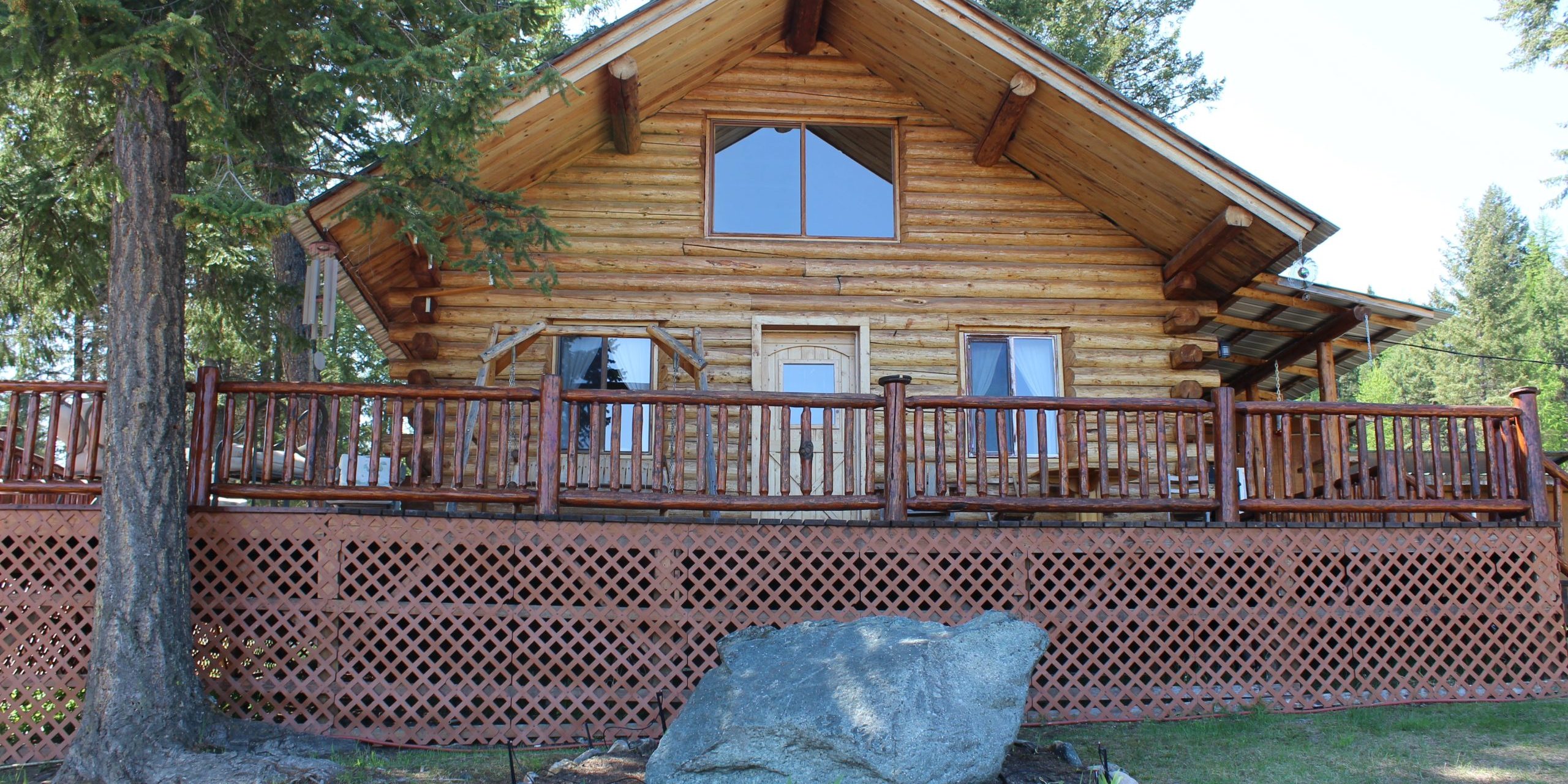
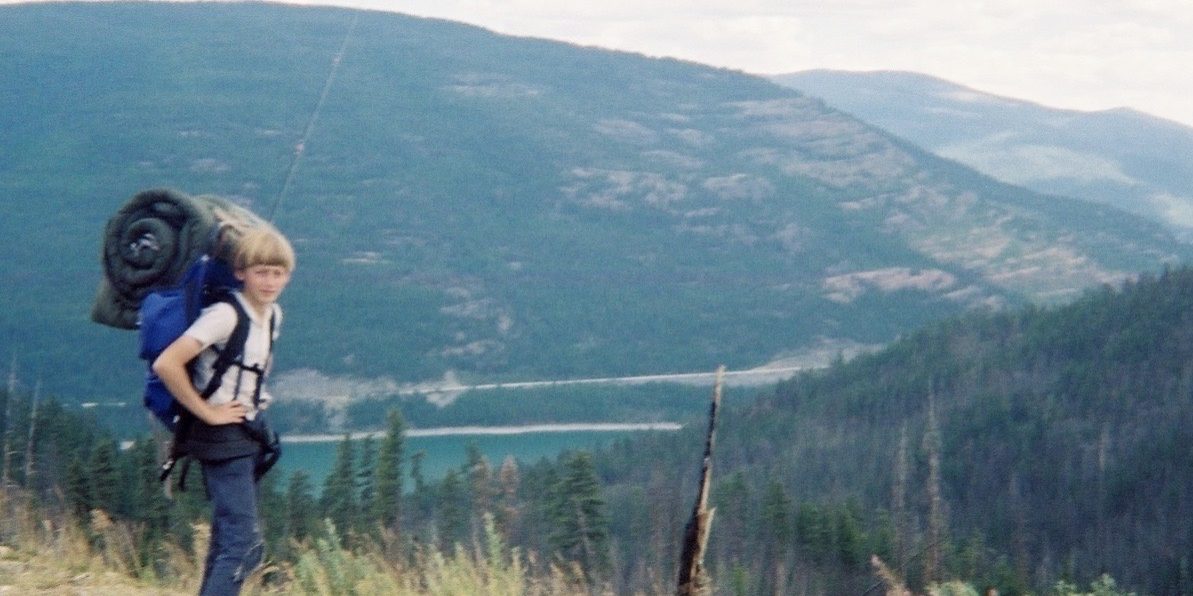
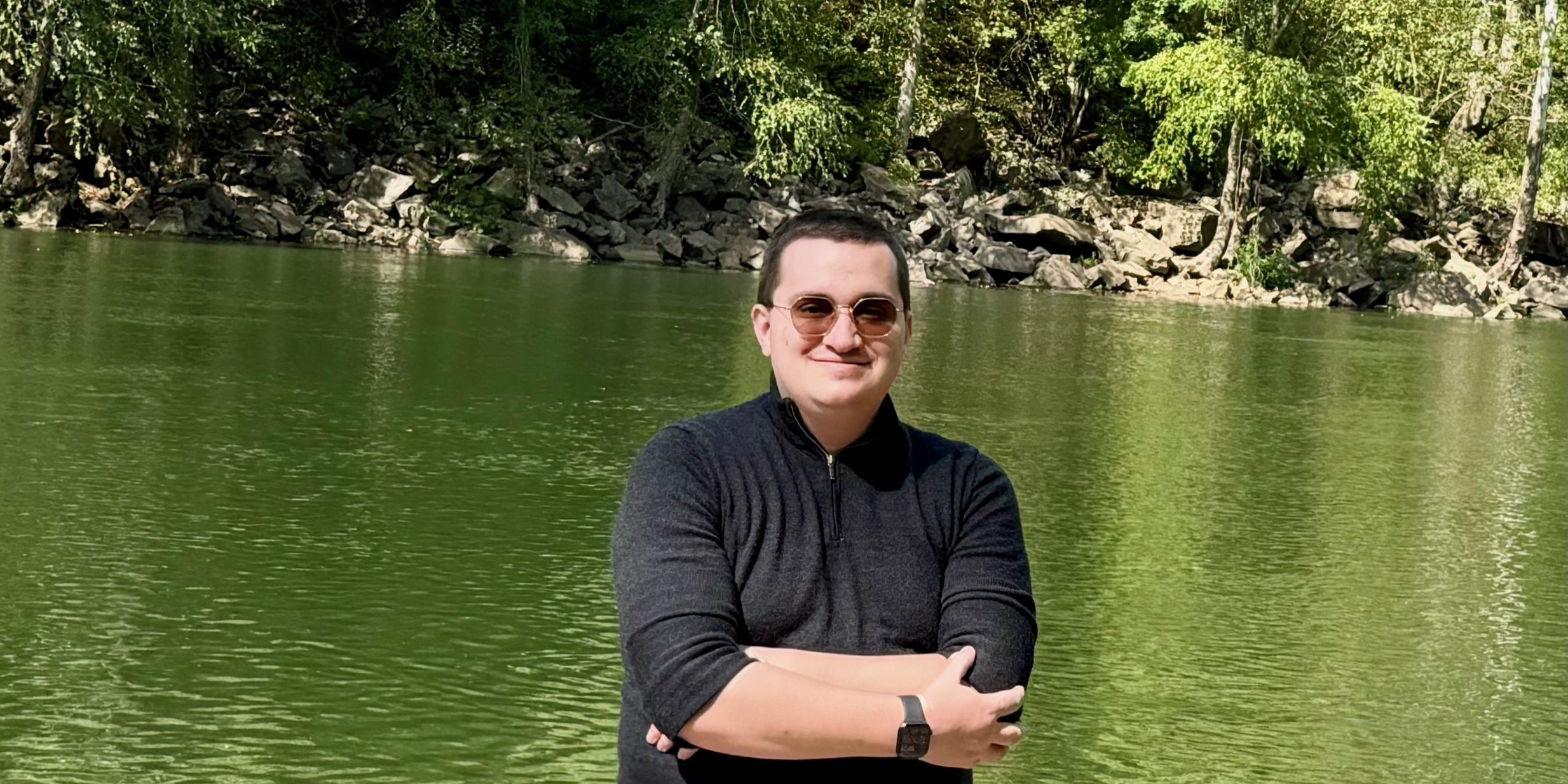
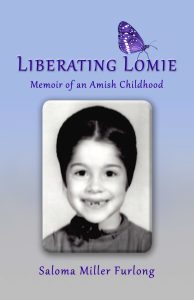
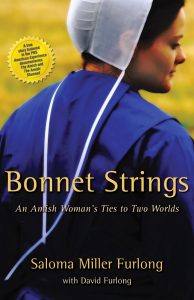
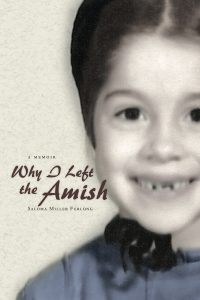
It is SO__ interesting to read your postings and learn of the struggles that some of the Amish have had in order to separate from the Amish and how they have overcome the difficulties. I have grown up as a member of the Old Mennonite Church and currently attend the First Old Mennonite church in the state of Kansas. One of my grandfathers was an evangelist in the Mennonite church circles. I never heard their stories about leaving the Amish but I know my grandfather did work for a portion of his life in an Amish community and was helpful in establishing a Mennonite Church there and became friends with many of the Amish.
My great-great grandparents (on the other side of my family), however, are both buried in Amish cemeteries, one in Yoder, Kansas, and one in Thomas, Oklahoma. I believe that some of these early families who moved west may have settled in areas where Mennonite churches were established and settlers migrated to them rather that starting or continuing to attend Amish groups. I always enjoy reading and appreciate family history of our family and of others as well. Blessings on you, Saloma, as you work to assist others as well with struggles and discouragements they have to deal with.
Hello Elnor. It’s great to see you here. Thank you for telling of your family history. It is always so interesting to make discoveries about our ancestors.
Thank you for your Blessings, and to you in return.
Thank you for telling this story of purserverence! Thank you my friend. I love it!!
You’re welcome, it is my pleasure.
Amazing story of how way leads to way for a person who heeded his inner voice.
Thank you for publishing.
I agree, Esther. Thank you for your comment.
Doc.
Write the book please.
thats my doctor
How cool!